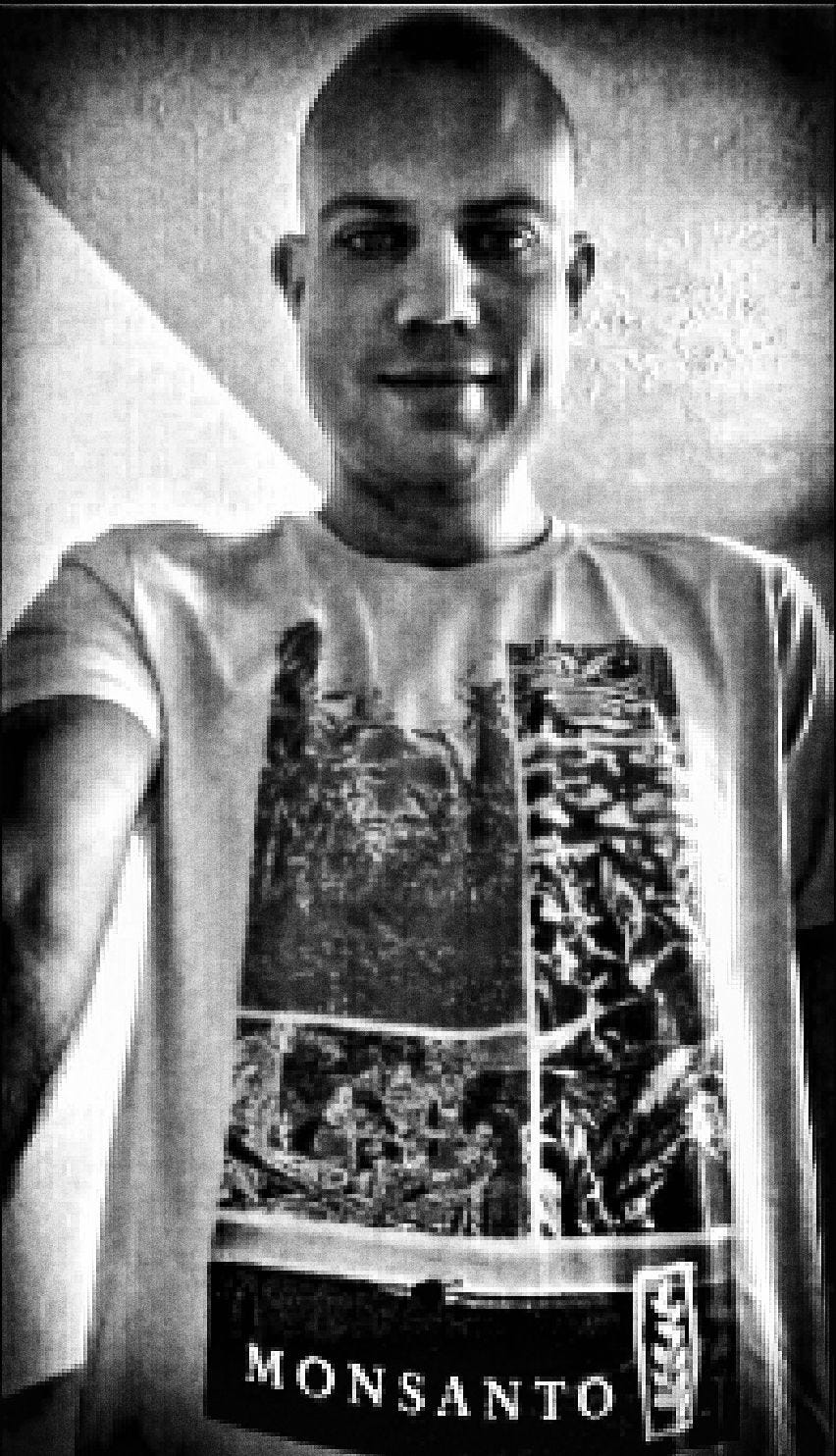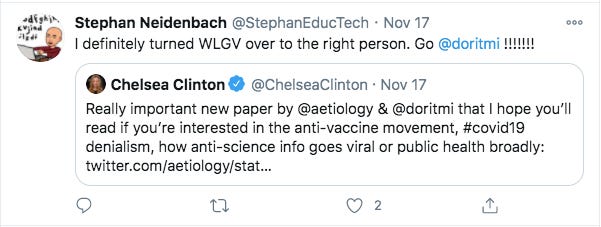Launched by Monsanto-Loving Middle School Teacher Stephan Neidenbach, Hate and Disinformation Thrive at “We Love GMOs and Vaccines”
Online extremists can harass journalists and academics for years by pretending to promote science.
8 minute read
Today’s culture is besieged by people who forge a warped shield of science to duck behind before launching defamation missiles at journalists and academics who toil to expose corporate-funded propaganda campaigns. Allies of tobacco deployed this tactic as did fossil fuel companies, and, of course, the agrichemical industry.
These harassment campaigns are now so simple, even a middle school teacher can run one. And to defend biotech agriculture and pesticide companies, few have shown greater zeal than middle school teacher Stephan Neidenbach, who has spent years haranguing professors and journalists, comparing them to Hitler, harassing their editors and employers, and charging some with racism—all this, while sometimes pleading with Monsanto to hire him as he worked in a classroom teaching children.
No, seriously.
Mr. Neidenbach began his campaign several years ago with a “We Love GMOs and Vaccines” website and online store, along with a Facebook page. He then added several venues where he wrote disparaging rants about journalists and professors; he also sought to turn this harassment into a money making venture by seeking donations and selling t-shirts.
To increase his exposure, Neidenbach allied himself with corporate-funded groups such as the Genetic Literacy Project, where he wrote hyperbolic, denigrating articles about New York Times reporter Eric Lipton (NY Times’ Eric Lipton defends anti-biotech, anti-vax Moms Across America, which harasses scientists) and Tom Philpott of Mother Jones (Conflict of interest? Mother Jones’ Tom Philpott’s connections to organic industry raise concerns).
Across the years, Neidenbach showed no restraint in attacking anyone, by any means necessary, if they expressed signs of favoring organic foods. To promote her gardening hobby, Long Island nurse Joan Shields posted a video of her nephew playing in her organic garden.
But Shields said Neidenbach took a screenshot of the video and replaced her nephew with a picture of Black slave children hoeing a field.
This photo was then posted to the “We Love GMOs and Vaccines” Facebook site, setting off a wave of persecution, as hundreds of his Facebook followers began sharing and commenting on the photo, and then contacting Shields to complain about her purported racism
“I thought, ‘This is insane!’” said Ms. Shields, adding that 245 accounts came to her Facebook page and began calling her a racist and posting her address and telephone number, as well as her husband’s Social Security number. “I kept blocking them and then finally deleted my Facebook account,” she said. “He incited a racial shitstorm.”
Mr. Neidenbach is employed as a middle school teacher in Maryland for Prince Georges’s County Public Schools (PGCPS) which maintains a policy against cyberbullying that advises parents, students and staff to report online harassment. When PGCPS chief executive officer Monica Goldson was contacted for comment about a long list of harassing behavior by Mr. Neidenbach, she emailed back that the matter was under review.
“We have no comment due to employee and student confidentiality concerns,” a PGCPS spokesperson later responded by email.
Mr. Neidenbach did not respond to repeated requests for comment about his online behavior.
“A fellow who is a middle school teacher bullying a distinguished university professor over his research—an academic who does this for a living—is completely incongruous,” said book author and New York University professor Nassim Taleb. After Taleb published a research article and an essay in the New York Times about the potential dangers to our food system from GMO agriculture, he faced an onslaught of harassment from Monsanto trolls contacting NYU to have him fired.
Neidenbach, meanwhile, began a social media campaign to equate Taleb with Hitler.
“This smear campaign says something about the educational system, said Taleb. “Would you want to have your children taught by this guy? This is an embarrassment.”
“Just a science fan boy,” wrote Neidenbach when he started the “We Love GMOs and Vaccines” website. “I started the Facebook page We Love GMOs and Vaccines in January of 2014 never thinking that it might actually catch on.”
And boy did it catch on. By spitting out vitriol and hate, yet shrouding himself in the mantle of science, Mr. Neidenbach attracted over 190,000 followers to his Facebook page within five years. In comparison, the consumer-health nonprofit Public Citizen has a venerable 50-year history with only 130,000 followers to their Facebook page.
Neidenbach then launched this horde against perceived threats, including journalists, activists, and professors who promoted organic agriculture or who criticized Monsanto or pesticides. Tactics included “doxing”—posting people’s private information online to incite harassment—and writing negative reviews about a person’s business to harm them financially.


In 2015, journalist Laura Krantz with the Boston Globe reported on documents that showed Harvard Professor Calestous Juma wrote a widely disseminated policy paper in support of genetically modified organisms at the behest of Monsanto. In response, Neidenbach composed a blog that alleged Krantz had undisclosed ties to the organic food industry.
“Please email the editors at the Boston Globe, as well as Ms. Krantz, and demand that an apology and retraction be made,” Neidenbach blogged, including the emails of several Globe editors for readers to contact.
Neidenbach then posted a link to the blog on the “We Love GMOs and Vaccines” Facebook page to start a harassment campaign against the reporter.
As his audience of supporters grew, Neidenbach announced that he wanted to leave the school room behind and convert his social media presence into a science communication job for the agrichemical industry. At one point, he tagged Monsanto’s then-Chief Technology Officer Robb Fraley in a tweet, “Does Monsanto need a biotech loving teacher for outreach? #hirestephan”
Another reporter who faced incessant bullying from Neidenbach is Carey Gillam, a contributing writer for The Guardian and research director of U.S. Right to Know. In 2017 Gillam wrote her first book “Whitewash: The Story of a Weed Killer, Cancer and the Corruption of Science.” To harm her book sales, Neidenbach began posting negative reviews on Amazon. The book went on to win the Rachel Carson Book Award from the Society of Environmental Journalists.
“As someone who has been targeted for online harassment by Neidenbach and others who appear to work in concert with each other, I know the reputational and emotional damage that can be done,” said Gillam in an email. “When people invent and spread false information with the intention of harming someone's personal life or career, they should be exposed and held accountable.”
A favored Neidenbach tactic is filing dozens of Freedom of Information Act (FOIA) requests on academics to intimidate them into silence. According to the website Muckrock, Neidenbach has dozens of outstanding FOIA requests on academics that he fears are working behind the scenes against the interests of the agrichemical industry.
When the documentary “Food Evolution” came out in 2017 to promote GMO agriculture, dozens of academics signed a letter protesting the film’s lack of scientific honesty. Neidenbach then filed a FOIA for the emails of those professors.
Professor Phil Howard of Michigan State told Vice:
Neidenbach's FOIA requests are intended as harassment, but they are also attacks on free speech and intellectual freedom. The burdens of responding to such trolls may discourage other researchers from speaking up in the future. I hope this is not the case, however, because these tactics suggest that zealous promoters of genetic engineering are increasingly desperate in their efforts to overcome public resistance.
Berkeley Professor Alastair Iles later explained how Neidenbach used the university documents he gathered through FOIA to spread false information and further harangue academics:
As a result, Neidenbach wrote a letter on the Medium website that claims the letter of concern was written at the behest of the organic food industry, without disclosing this connection, and is based on false information (i.e. we did not see the film). Unfortunately, but perhaps unsurprisingly, Neidenbach chose to quote very selectively from the email messages that he was able to extract. He and his colleagues are also circulating images of the extracts on Twitter.
Neidenbach’s FOIA crusade continues. A few months back, he tweeted a FOIA denial from UC-San Francisco, an institution he targeted after they began archiving Monsanto documents showing the company’s misbehaviour.
In 2019, the Canadian Broadcast Company (CBC) announced it would show “Modified: A food lover’s journey into GMOs” about filmmaker Aube Giroux and her mother as they investigate why GMOs are not labeled in the United States and Canada. Famed chef Jacques Pépin praised the work as “a very personal, tender, touching tribute and a well-researched, enlightening and powerful documentary.”
In the lead up to the CBC national broadcast of her documentary, Ms. Giroux became the focus of a very intense and coordinated social media attack, some of which she tracked back to Stephan Neidenbach at “We Love GMOs and Vaccines.” The film went on to win 15 awards, including the 2019 James Beard Foundation Broadcast Media Award for best documentary.
Neidenbach appears to have reached the climax of his influence in an NBC News article that awkwardly labeled him a vaccine advocate working “to combat growing misinformation on Facebook.” To journalist Brandy Zadrozny, Neidenbach explained that his basic strategy was to be inflammatory.
“I’m not an organization, and I’m not trying to run a nonprofit. I’m just a school teacher. And I don’t have to be as nice as I do in the classroom,” said Neidenbach, adding that he wanted to find someone with a medical or scientific background to take over the Facebook page and lead its following.
Last November, Neidenbach applauded his own decision to hand over the “We Love GMOs and Vaccines” Facebook page to Dorit Reiss, a professor at UC Hastings Law. The Facebook page now boasts over 246,000 followers.
Ms. Reiss did not respond to a request for comment. Last week, Mr. Neidenbach deleted his personal Twitter account @stephaneductech.
NYU’s Nassim Taleb said that Neidenbach’s years of harassment did not harm him, but this is only because he has been privileged with status, money, and power.
“But for people who are not privileged like me, with credentials, and who has money… Think about how vulnerable others are,” Taleb said.
While he cannot prove it, Taleb suspects that Neidenbach worked alongside or was at least promoted by PR firms trying to disseminate a distorted view of science and to harm critics of the agrichemical industry. Most academics are risk averse and will shrink from online trolls like Neidenbach, he added, and journalists can be very vulnerable to online persecution.
“This can make a person’s life impossible,” Taleb said. “Science needs to adjust to this if it hopes to evolve.”
NOTE TO READERS: Our following at The DisInformation Chronicle continues to grow. We thank you so much and hope you continue reading. Please add more comments! Inspired by “Dr. Strangelove” an ardent reader submitted this photo of Stephan Neidenbach astride a glyphosate pesticide bomb to “protect our precious bodily fluids” from organic foods. Enjoy.















Someone put together a Sourcewatch page for "We Love GMOs and Vaccines". https://www.sourcewatch.org/index.php?title=We_Love_GMOs_and_Vaccines
Sad reflection of what personality types thrive by advocating for toxic profiteers!